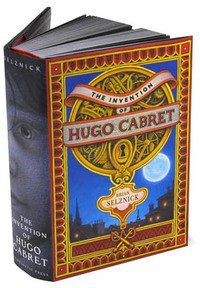Not the film of all time
To ring in the new year, we went to see the new Martin Scorsese film, Hugo, based on the book, The Invention of Hugo Cabret, by Brian Selznick. This 2 hour+ film did not seduce me on the merits of the direction, plot or acting. I thought of it more like a nostalgic film for the film industry. At best, Hugo is a film about time, rather than a film of all time. However, the “picture” — as in the cinematography — was at times delightful. Being in Paris and having been a student of film at university, I can appreciate the desire to recover and repurpose archival film and the wonderful creativity of Georges Méliès. The film does a good job of reinserting old film into a new context, which I am going to assume was one of Scorsese’s primary motivations for making the film.
Oh yes, there was one other thing: vocabulary. The charming young Isabelle (Chloë Grace Moretz) spent the entire film showing off her good English vocab. I smiled, thinking that maybe some kids would pick up some words. Only problem, there was no clickable link through to the dictionary to verify the meaning!
The collateral messages
Meanwhile, if I may not have been overly thrilled with the writing and some of the acting, I did have a few “moments” in the film, where my internal message center lit up. Here are the three parts to the film that did ring true for me:
- Find your North. I like to use the expression, “to find your North”, because we all need a compass to guide us, especially through these turbulent times. As the film explicits for the film industry, we sometimes yearn for the nostalgia of the “good ‘ole days,” filled with tradition and, yet, synonym of rejecting change. I particularly liked the passage when the small boy, Hugo Cabret (Asa Butterfield) says to his co-adventurer, Isabelle, that in machinery every piece has a purpose. And, Hugo and Isabelle, being a part of the world’s machine, have their purpose, too. The point is find one’s purpose, or one’s North.
- Storytelling. A common theme these days for brand marketers — because brands need to learn how to tell a story to which its customers can relate — storytelling has long been monopolized by the cellulose film industry. As was exposed in a delightful TEDx Marin speech by Robert Tercek, we as a culture have handed over the reigns to Hollywood to do the storytelling for us and that it is time for us to take storytelling or “personal narrative” back. Dreams and storytelling are what films can bring to us. But, we should all be allowed to have our individual dreams in real life (IRL) and to be able to tell our stories (blogs and more…).
- The French smile. The Station Inspector of the brilliantly reconstructed Quai d’Orsay train station, is played by the ever surprising Sacha Baron Cohen, aka Borat and Ali G. Not the nicest of Station Inspectors, but certainly up there with the quirkiest, the French Inspector is not good at smiling. As the film goes on, he develops a repertoire of 3 smiles with which to seduce the flower girl. I’m not sure how intentional this was, but it certainly made me think of the French lack of propensity to smile in a happy way (as opposed to a smirk), much less to laugh.
I’m not going to make you go out to see the film with this review. The film has its moments and I enjoyed Christopher Lee as the librarian, Mr Labisse, and Ben Kingsley as Georges Melies. Kingsley, whose birth name was Krishna Bhanji, typified a rather international crew. Hugo is a touching tribute to old film with a couple of poignant moments, but not well enough written to have more than 2.5 out of 5 rating.












Trackbacks/Pingbacks